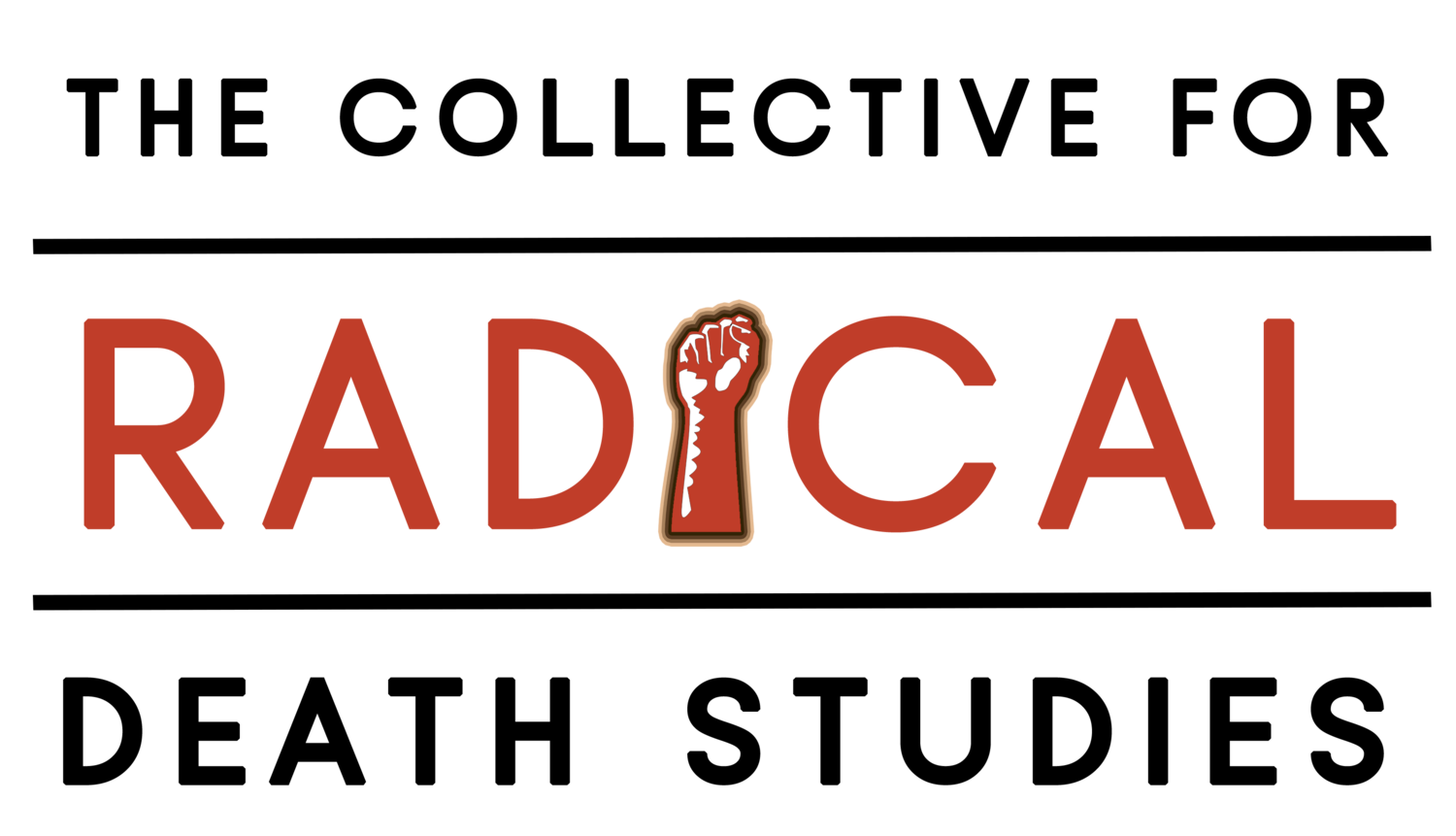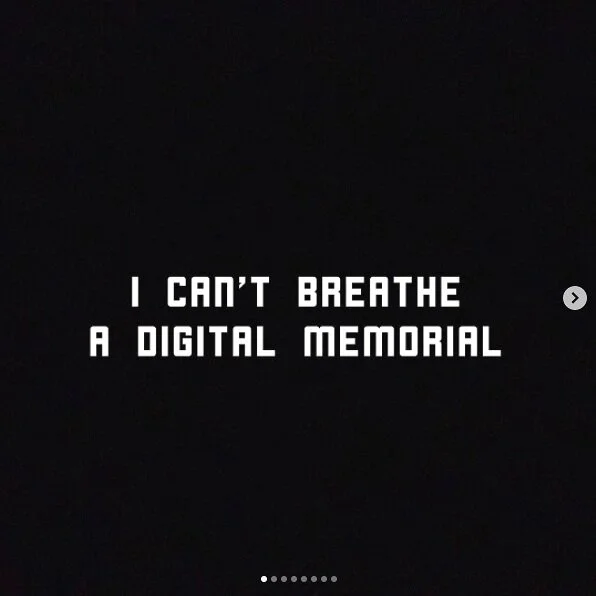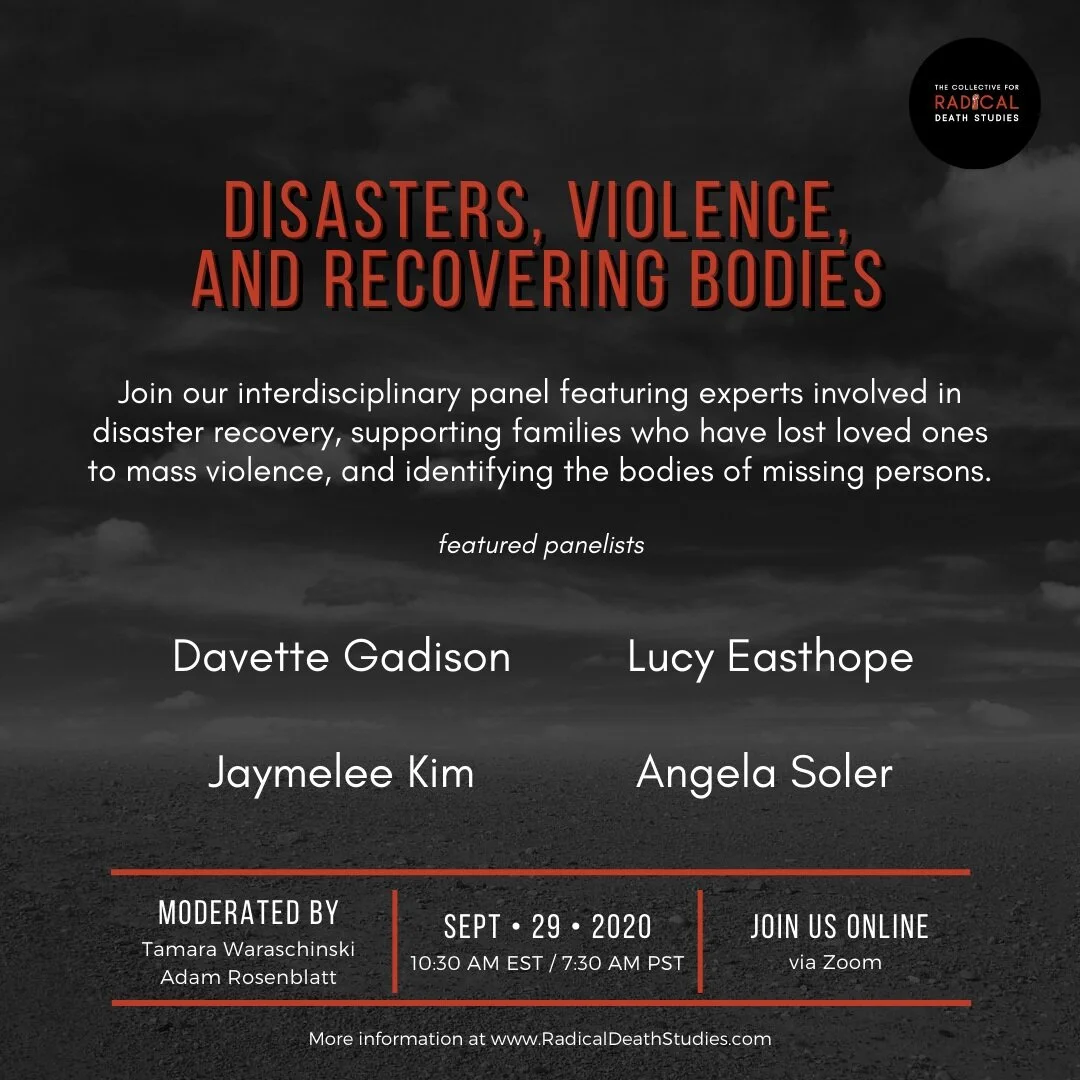Breathe In and Out; Say Their Name: Renée Ater’s Instagram-Based Memorial, “I Can’t Breathe”
By: Kaylee P. Alexander
Disasters, Violence, and Recovering Bodies
This interdisciplinary panel features experts involved in disaster recovery, supporting families who have lost loved ones to mass violence, and identifying the bodies of missing persons in contexts including post-conflict northern Uganda, the United Kingdom, Armenia and Azerbaijan, a forgotten massacre site of striking African American workers in the U.S., and the “killing fields” of the U.S.-Mexico Border. Together, they will explore how their work challenges dominant paradigms of experts’ detachment and objectivity, what constitutes a disaster site, how it should be investigated, how mourners and bodies are treated, and what kinds of healing or “closure” can be hoped for.
Davette Gadison Forensic Coordinator for the South Caucusas under the Forensic Unit of the International Committee of the Red Cross.
Angela Soler Board Certified Forensic Anthropologist at the New York City Office of Chief Medical Examiner (NYC OCME).
Jaymelee Kim Associate Professor of Forensic Sciences, University of Findlay, Ohio.
Lucy Easthope Professor in Practice of Risk and Hazard at the University of Durham. Fellow in Mass Fatalities and Pandemics at the Centre for Death and Society, Univ. of Bath.
Police Brutality, Slave Past, & Digital Remembrance: A Conversation with Dr Renée Ater
Dr. Renée Ater is Provost Visiting Associate Professor in Africana Studies at Brown University (2020/2021) and Associate Professor Emerita at the University of Maryland. She holds a B.A. from Oberlin College, and a M.A. and Ph.D. in Art History from the University of Maryland. A public scholar who works at the intersection of art and history, Dr. Ater’s research focuses on monuments, race, national identity, and public space. She is the author of Keith Morrison, volume 5 of The David C. Driskell Series of African American Art (Pomegranate Books, 2005) and Remaking Race and History: The Sculpture of Meta Warrick Fuller (University of California Press, 2011). She has written on a wide range of public monuments including the Unsung Founders Memorial at the University of North Carolina; the African American Civil War Memorial in Washington, DC; the Martin Luther King Jr. Memorial in Rocky Mount, North Carolina; the Tuskegee Airmen National Historic Site in Alabama; and the Crispus Attucks Memorial in Boston. Currently, Dr. Ater is engaged in an open-source digital project entitled Contemporary Monuments to the Slave Past: Race, Memorialization, Public Space, and Civic Engagement, which has been funded through the National Endowment for the Humanities-Mellon Foundation, The Getty Research Institute, and the Smithsonian Office of Fellowships.
Canada Implemented Social Distancing from the Dead to Save the Living
By: Robyn Lacy
Crisis Within a Crisis: Exploring Race, Ethnicity & Nationality During a Pandemic
George Gumisiriza has recently been awarded SWDTP ESRC (1+3) PhD Scholarship at the University of Bath (UK). His area of study is Repatriationscapes: death and repatriation of human remains among African diaspora. A study into selected cases in London (UK). George’s PhD study programme is a continuation of his Master of Science in Social and Cultural Theory obtained from the University of Bristol (UK). George’s recent research addresses the Significance of the repatriation of human remains as an aspect of cultural belonging among the Gambian community in Wales, UK where he lives! The study revealed that the narrative of the deceased diaspora is embodied in the obligation for the living [Gambians in the UK] to repatriate the body to their home country for burial, thereby, exploring how death and body repatriation are framed within the migration context to address multi-dimensional social, cultural and religious perspectives. George is a Further Education lecturer and spoken word artist who is passionate about social community cohesion and integration in the UK. George is a member of Migration Mobilities Bristol (MMB).
Dr. Judith López Peñaloza received a Bachelor’s and Master’s Degree in Clinical Psychology from California State University, San Jose Campus. She obtained a PhD in Psychology by UNAM (Mexico’s National Autonomous University) in 2008 and has been a tenured Professor and Researcher for the last 18 years at the University of Michoacán, Mexico. As a clinician, she has been in private practice since 1990. Her main research interests are around the issues of death, grief, trauma and resiliency. She has received numerous distinctions for her work in teaching and research, such as the one given by CONACYT, among others, for research quality work, which placed her in the National List of Recognized Researchers (SNI: National Research System), since 2013. She is the author of several book chapters and articles on the topics of her research interests. She is a frequent speaker in conferences in different parts of Mexico and the world.
Dr. Osman Balkan is a Visiting Assistant Professor of Political Science at Swarthmore College. His research and teaching focuses on the politics of migration, identity, and citizenship in Western Europe and the Middle East. He is currently working on a book about the end-of-life practices of Muslims in Germany. For more information, please visit his personal website at: http://www.osmanbalkan.com
Moderator - Dr. Kami Fletcher is an associate professor of history at Albright College and president of the Collective for Radical Death Studies and co-editor of Till Death Do Us Part: American Ethnic Cemeteries as Borders Uncrossed examines the internal and external drives among ethnic, religious, and racial groups to separate their dead. For more on Dr. Fletcher visit her website at www.kamifletcher.weebly.com and contact her on Twitter using @kamifletcher36





